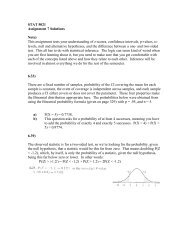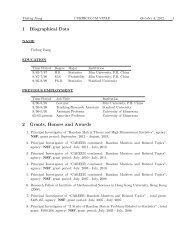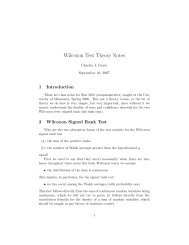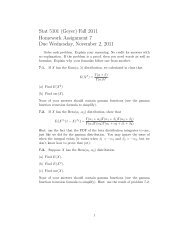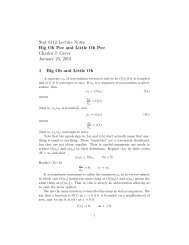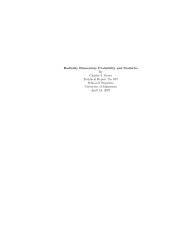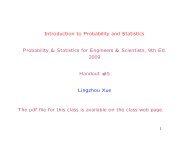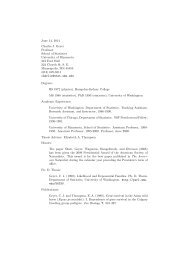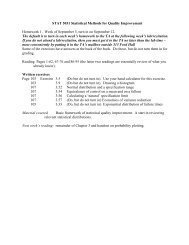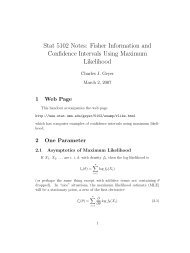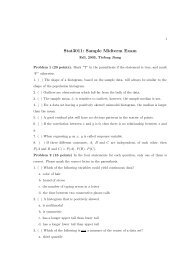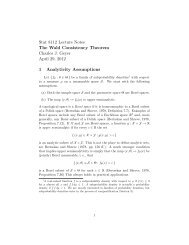- Page 1 and 2:
Stat 5101 Lecture NotesCharles J. G
- Page 3 and 4:
Contents1 Random Variables and Chan
- Page 5 and 6:
CONTENTSv5.1.4 Variance Matrices ..
- Page 7 and 8:
CONTENTSviiD Relations Among Brand
- Page 9 and 10:
Chapter 1Random Variables andChange
- Page 11 and 12:
1.1. RANDOM VARIABLES 3Sometimes it
- Page 13 and 14:
1.1. RANDOM VARIABLES 5that is, X i
- Page 15 and 16:
1.2. CHANGE OF VARIABLES 7the union
- Page 17 and 18:
1.2. CHANGE OF VARIABLES 9Thus even
- Page 19 and 20:
1.2. CHANGE OF VARIABLES 11Every in
- Page 21 and 22:
1.2. CHANGE OF VARIABLES 13where f
- Page 23 and 24:
1.3. RANDOM VECTORS 151.3.1 Discret
- Page 25 and 26:
1.4. THE SUPPORT OF A RANDOM VARIAB
- Page 27 and 28:
1.5. JOINT AND MARGINAL DISTRIBUTIO
- Page 29 and 30:
1.5. JOINT AND MARGINAL DISTRIBUTIO
- Page 31 and 32:
1.6. MULTIVARIABLE CHANGE OF VARIAB
- Page 33 and 34:
1.6. MULTIVARIABLE CHANGE OF VARIAB
- Page 35 and 36:
1.6. MULTIVARIABLE CHANGE OF VARIAB
- Page 37 and 38:
1.6. MULTIVARIABLE CHANGE OF VARIAB
- Page 39 and 40:
Chapter 2Expectation2.1 Introductio
- Page 41 and 42:
2.3. BASIC PROPERTIES 33expectation
- Page 43 and 44:
2.3. BASIC PROPERTIES 35that is, th
- Page 45 and 46:
2.4. MOMENTS 37The Multiplicativity
- Page 47 and 48:
2.4. MOMENTS 39holds for all real-v
- Page 49 and 50: 2.4. MOMENTS 41simple, it is often
- Page 51 and 52: 2.4. MOMENTS 43In contrast, for all
- Page 53 and 54: 2.4. MOMENTS 45is the sum of the ex
- Page 55 and 56: 2.4. MOMENTS 47Proof. Just take a i
- Page 57 and 58: 2.4. MOMENTS 49What happens to Coro
- Page 59 and 60: 2.4. MOMENTS 51This inequality is a
- Page 61 and 62: 2.4. MOMENTS 53(a)Why does (2.7) as
- Page 63 and 64: 2.5. PROBABILITY THEORY AS LINEAR A
- Page 65 and 66: 2.5. PROBABILITY THEORY AS LINEAR A
- Page 67 and 68: 2.5. PROBABILITY THEORY AS LINEAR A
- Page 69 and 70: 2.5. PROBABILITY THEORY AS LINEAR A
- Page 71 and 72: 2.5. PROBABILITY THEORY AS LINEAR A
- Page 73 and 74: 2.5. PROBABILITY THEORY AS LINEAR A
- Page 75 and 76: 2.5. PROBABILITY THEORY AS LINEAR A
- Page 77 and 78: 2.5. PROBABILITY THEORY AS LINEAR A
- Page 79 and 80: 2.5. PROBABILITY THEORY AS LINEAR A
- Page 81 and 82: 2.5. PROBABILITY THEORY AS LINEAR A
- Page 83 and 84: 2.6. PROBABILITY IS A SPECIAL CASE
- Page 85 and 86: 2.7. INDEPENDENCE 772.7 Independenc
- Page 87 and 88: 2.7. INDEPENDENCE 79Then X and Y ar
- Page 89 and 90: 2.7. INDEPENDENCE 81Show that the f
- Page 91 and 92: Chapter 3Conditional Probability an
- Page 93 and 94: 3.1. PARAMETRIC FAMILIES OF DISTRIB
- Page 95 and 96: 3.2. CONDITIONAL PROBABILITY DISTRI
- Page 97 and 98: 3.3. AXIOMS FOR CONDITIONAL EXPECTA
- Page 99: 3.3. AXIOMS FOR CONDITIONAL EXPECTA
- Page 103 and 104: 3.4. JOINT, CONDITIONAL, AND MARGIN
- Page 105 and 106: 3.4. JOINT, CONDITIONAL, AND MARGIN
- Page 107 and 108: 3.4. JOINT, CONDITIONAL, AND MARGIN
- Page 109 and 110: 3.4. JOINT, CONDITIONAL, AND MARGIN
- Page 111 and 112: 3.4. JOINT, CONDITIONAL, AND MARGIN
- Page 113 and 114: 3.5. CONDITIONAL EXPECTATION AND PR
- Page 115 and 116: 3.5. CONDITIONAL EXPECTATION AND PR
- Page 117 and 118: 3.5. CONDITIONAL EXPECTATION AND PR
- Page 119 and 120: Chapter 4Parametric Families ofDist
- Page 121 and 122: 4.1. LOCATION-SCALE FAMILIES 113The
- Page 123 and 124: 4.2. THE GAMMA DISTRIBUTION 115Show
- Page 125 and 126: 4.3. THE BETA DISTRIBUTION 117cours
- Page 127 and 128: 4.4. THE POISSON PROCESS 119Hence t
- Page 129 and 130: 4.4. THE POISSON PROCESS 121Definit
- Page 131 and 132: 4.4. THE POISSON PROCESS 123measure
- Page 133 and 134: 4.4. THE POISSON PROCESS 1254-3. A
- Page 135 and 136: Chapter 5Multivariate DistributionT
- Page 137 and 138: 5.1. RANDOM VECTORS 129Again like r
- Page 139 and 140: 5.1. RANDOM VECTORS 1315.1.6 Covari
- Page 141 and 142: 5.1. RANDOM VECTORS 1335.1.7 Linear
- Page 143 and 144: 5.1. RANDOM VECTORS 135Example 5.1.
- Page 145 and 146: 5.1. RANDOM VECTORS 137Example 5.1.
- Page 147 and 148: 5.1. RANDOM VECTORS 139where we hav
- Page 149 and 150: 5.2. THE MULTIVARIATE NORMAL DISTRI
- Page 151 and 152:
5.2. THE MULTIVARIATE NORMAL DISTRI
- Page 153 and 154:
5.2. THE MULTIVARIATE NORMAL DISTRI
- Page 155 and 156:
5.2. THE MULTIVARIATE NORMAL DISTRI
- Page 157 and 158:
5.2. THE MULTIVARIATE NORMAL DISTRI
- Page 159 and 160:
5.3. BERNOULLI RANDOM VECTORS 151Th
- Page 161 and 162:
5.3. BERNOULLI RANDOM VECTORS 153yo
- Page 163 and 164:
5.4. THE MULTINOMIAL DISTRIBUTION 1
- Page 165 and 166:
5.4. THE MULTINOMIAL DISTRIBUTION 1
- Page 167 and 168:
5.4. THE MULTINOMIAL DISTRIBUTION 1
- Page 169 and 170:
5.4. THE MULTINOMIAL DISTRIBUTION 1
- Page 171 and 172:
5.4. THE MULTINOMIAL DISTRIBUTION 1
- Page 173 and 174:
Chapter 6Convergence Concepts6.1 Un
- Page 175 and 176:
6.1. UNIVARIATE THEORY 167It simpli
- Page 177 and 178:
6.1. UNIVARIATE THEORY 169density o
- Page 179 and 180:
6.1. UNIVARIATE THEORY 171Rewriting
- Page 181 and 182:
6.1. UNIVARIATE THEORY 173Comment T
- Page 183 and 184:
6.1. UNIVARIATE THEORY 175Problems6
- Page 185 and 186:
Chapter 7Sampling Theory7.1 Empiric
- Page 187 and 188:
7.1. EMPIRICAL DISTRIBUTIONS 1797.1
- Page 189 and 190:
7.1. EMPIRICAL DISTRIBUTIONS 181Def
- Page 191 and 192:
7.1. EMPIRICAL DISTRIBUTIONS 183To
- Page 193 and 194:
7.2. SAMPLES AND POPULATIONS 185The
- Page 195 and 196:
7.2. SAMPLES AND POPULATIONS 187•
- Page 197 and 198:
7.3. SAMPLING DISTRIBUTIONS OF SAMP
- Page 199 and 200:
7.3. SAMPLING DISTRIBUTIONS OF SAMP
- Page 201 and 202:
7.3. SAMPLING DISTRIBUTIONS OF SAMP
- Page 203 and 204:
7.3. SAMPLING DISTRIBUTIONS OF SAMP
- Page 205 and 206:
7.3. SAMPLING DISTRIBUTIONS OF SAMP
- Page 207 and 208:
7.3. SAMPLING DISTRIBUTIONS OF SAMP
- Page 209 and 210:
7.3. SAMPLING DISTRIBUTIONS OF SAMP
- Page 211 and 212:
7.3. SAMPLING DISTRIBUTIONS OF SAMP
- Page 213 and 214:
7.4. SAMPLING DISTRIBUTIONS OF SAMP
- Page 215 and 216:
7.4. SAMPLING DISTRIBUTIONS OF SAMP
- Page 217 and 218:
7.4. SAMPLING DISTRIBUTIONS OF SAMP
- Page 219 and 220:
Appendix AGreek LettersTable A.1: T
- Page 221 and 222:
Appendix BSummary of Brand-NameDist
- Page 223 and 224:
B.1. DISCRETE DISTRIBUTIONS 215B.1.
- Page 225 and 226:
B.2. CONTINUOUS DISTRIBUTIONS 217Th
- Page 227 and 228:
B.2. CONTINUOUS DISTRIBUTIONS 219B.
- Page 229 and 230:
B.4. DISCRETE MULTIVARIATE DISTRIBU
- Page 231 and 232:
B.5. CONTINUOUS MULTIVARIATE DISTRI
- Page 233 and 234:
B.5. CONTINUOUS MULTIVARIATE DISTRI
- Page 235 and 236:
Appendix CAddition Rules forDistrib
- Page 237 and 238:
Appendix DRelations Among BrandName
- Page 239 and 240:
Appendix EEigenvalues andEigenvecto
- Page 241 and 242:
E.2. EIGENVALUES AND EIGENVECTORS 2
- Page 243 and 244:
E.2. EIGENVALUES AND EIGENVECTORS 2
- Page 245 and 246:
E.3. POSITIVE DEFINITE MATRICES 237
- Page 247:
Appendix FNormal Approximations for





